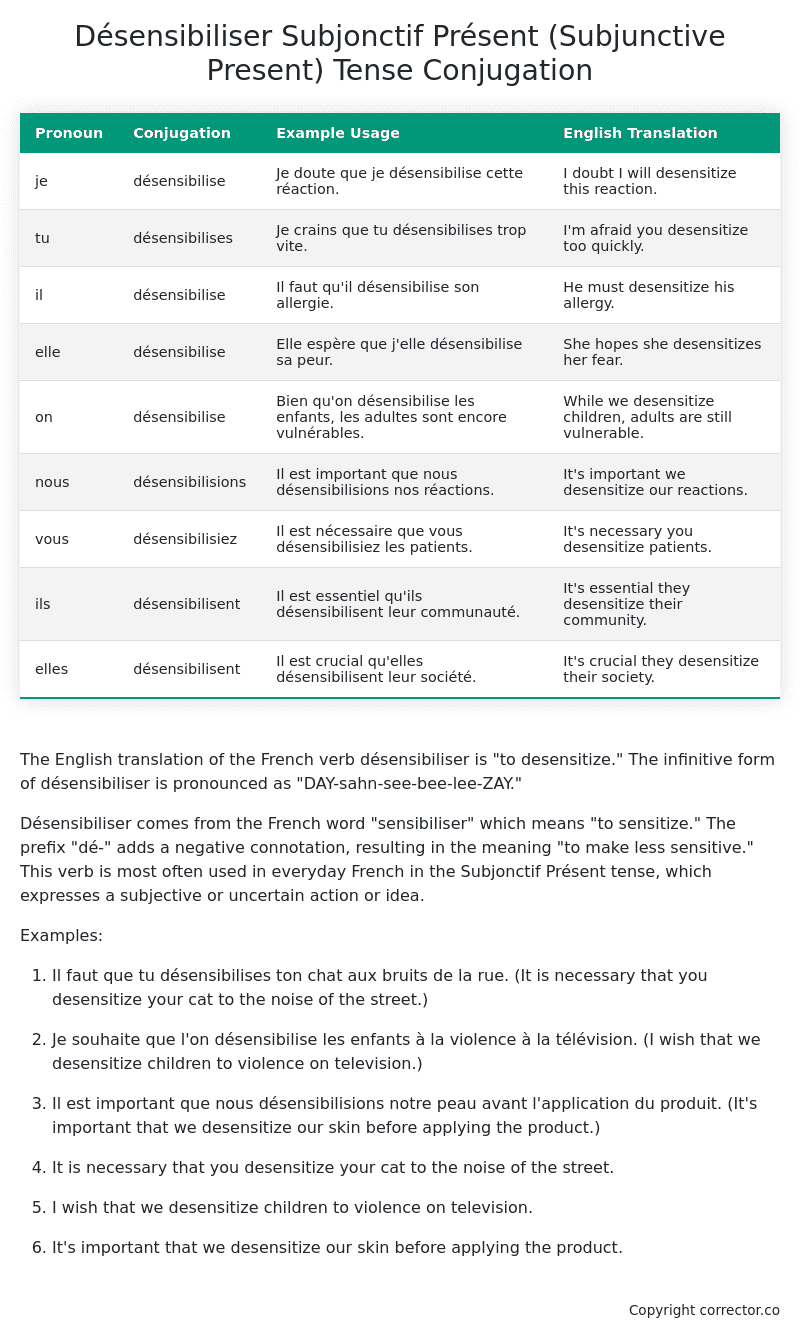Subjonctif Présent (Subjunctive Present) Tense Conjugation of the French Verb désensibiliser
Introduction to the verb désensibiliser
The English translation of the French verb désensibiliser is “to desensitize.” The infinitive form of désensibiliser is pronounced as “DAY-sahn-see-bee-lee-ZAY.”
Désensibiliser comes from the French word “sensibiliser” which means “to sensitize.” The prefix “dé-” adds a negative connotation, resulting in the meaning “to make less sensitive.” This verb is most often used in everyday French in the Subjonctif Présent tense, which expresses a subjective or uncertain action or idea.
Examples:
-
Il faut que tu désensibilises ton chat aux bruits de la rue. (It is necessary that you desensitize your cat to the noise of the street.)
-
Je souhaite que l’on désensibilise les enfants à la violence à la télévision. (I wish that we desensitize children to violence on television.)
-
Il est important que nous désensibilisions notre peau avant l’application du produit. (It’s important that we desensitize our skin before applying the product.)
-
It is necessary that you desensitize your cat to the noise of the street.
-
I wish that we desensitize children to violence on television.
-
It’s important that we desensitize our skin before applying the product.
Table of the Subjonctif Présent (Subjunctive Present) Tense Conjugation of désensibiliser
| Pronoun | Conjugation | Example Usage | English Translation |
|---|---|---|---|
| je | désensibilise | Je doute que je désensibilise cette réaction. | I doubt I will desensitize this reaction. |
| tu | désensibilises | Je crains que tu désensibilises trop vite. | I’m afraid you desensitize too quickly. |
| il | désensibilise | Il faut qu’il désensibilise son allergie. | He must desensitize his allergy. |
| elle | désensibilise | Elle espère que j’elle désensibilise sa peur. | She hopes she desensitizes her fear. |
| on | désensibilise | Bien qu’on désensibilise les enfants, les adultes sont encore vulnérables. | While we desensitize children, adults are still vulnerable. |
| nous | désensibilisions | Il est important que nous désensibilisions nos réactions. | It’s important we desensitize our reactions. |
| vous | désensibilisiez | Il est nécessaire que vous désensibilisiez les patients. | It’s necessary you desensitize patients. |
| ils | désensibilisent | Il est essentiel qu’ils désensibilisent leur communauté. | It’s essential they desensitize their community. |
| elles | désensibilisent | Il est crucial qu’elles désensibilisent leur société. | It’s crucial they desensitize their society. |
Other Conjugations for Désensibiliser.
Le Present (Present Tense) Conjugation of the French Verb désensibiliser
Imparfait (Imperfect) Tense Conjugation of the French Verb désensibiliser
Passé Simple (Simple Past) Tense Conjugation of the French Verb désensibiliser
Passé Composé (Present Perfect) Tense Conjugation of the French Verb désensibiliser
Futur Simple (Simple Future) Tense Conjugation of the French Verb désensibiliser
Futur Proche (Near Future) Tense Conjugation of the French Verb désensibiliser
Plus-que-parfait (Pluperfect) Tense Conjugation of the French Verb désensibiliser
Passé Antérieur (Past Anterior) Tense Conjugation of the French Verb désensibiliser
Futur Antérieur (Future Anterior) Tense Conjugation of the French Verb désensibiliser
Subjonctif Présent (Subjunctive Present) Tense Conjugation of the French Verb désensibiliser (this article)
Subjonctif Passé (Subjunctive Past) Tense Conjugation of the French Verb désensibiliser
Subjonctif Imparfait (Subjunctive Imperfect) Tense Conjugation of the French Verb désensibiliser
Conditionnel Présent (Conditional Present) Tense Conjugation of the French Verb désensibiliser
Conditionnel Passé (Conditional Past) Tense Conjugation of the French Verb désensibiliser
L’impératif Présent (Imperative Present) Tense Conjugation of the French Verb désensibiliser
L’infinitif Présent (Infinitive Present) Tense Conjugation of the French Verb désensibiliser
Struggling with French verbs or the language in general? Why not use our free French Grammar Checker – no registration required!
Get a FREE Download Study Sheet of this Conjugation 🔥
Simply right click the image below, click “save image” and get your free reference for the désensibiliser Subjonctif Présent tense conjugation!

Désensibiliser – About the French Subjonctif Présent (Subjunctive Present) Tense
Formation of the Subjonctif Présent
Common Everyday Usage Patterns
Interactions with Other Tenses
Summary
I hope you enjoyed this article on the verb désensibiliser. Still in a learning mood? Check out another TOTALLY random French verb conjugation!


